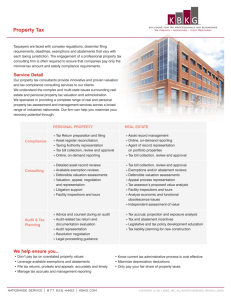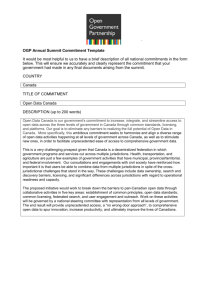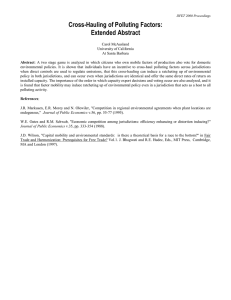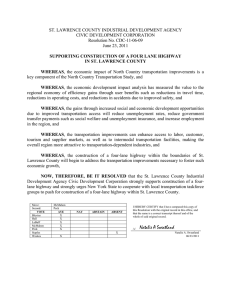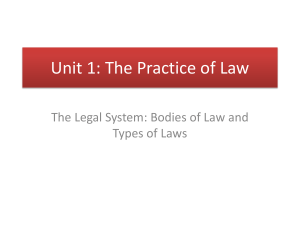Payment in Lieu of Taxes (PILOT) Policy ____________________________________________________
advertisement
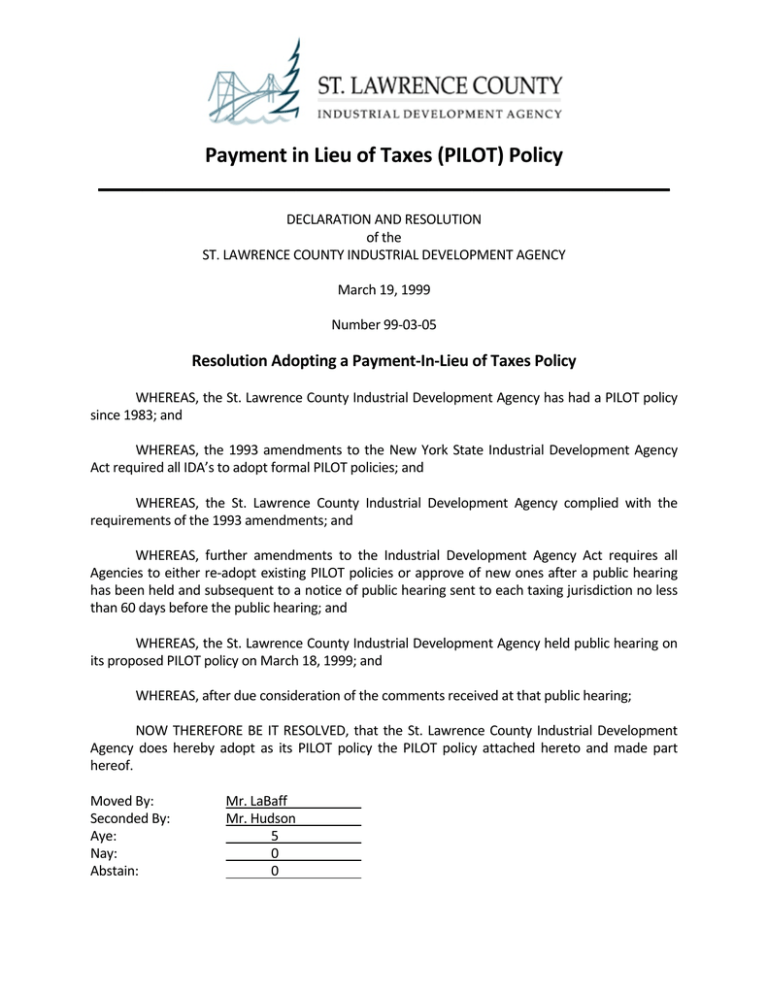
Payment in Lieu of Taxes (PILOT) Policy ____________________________________________________ DECLARATION AND RESOLUTION of the ST. LAWRENCE COUNTY INDUSTRIAL DEVELOPMENT AGENCY March 19, 1999 Number 99‐03‐05 Resolution Adopting a Payment‐In‐Lieu of Taxes Policy WHEREAS, the St. Lawrence County Industrial Development Agency has had a PILOT policy since 1983; and WHEREAS, the 1993 amendments to the New York State Industrial Development Agency Act required all IDA’s to adopt formal PILOT policies; and WHEREAS, the St. Lawrence County Industrial Development Agency complied with the requirements of the 1993 amendments; and WHEREAS, further amendments to the Industrial Development Agency Act requires all Agencies to either re‐adopt existing PILOT policies or approve of new ones after a public hearing has been held and subsequent to a notice of public hearing sent to each taxing jurisdiction no less than 60 days before the public hearing; and WHEREAS, the St. Lawrence County Industrial Development Agency held public hearing on its proposed PILOT policy on March 18, 1999; and WHEREAS, after due consideration of the comments received at that public hearing; NOW THEREFORE BE IT RESOLVED, that the St. Lawrence County Industrial Development Agency does hereby adopt as its PILOT policy the PILOT policy attached hereto and made part hereof. Moved By: Mr. LaBaff Seconded By: Mr. Hudson Aye: 5 Nay: 0 Abstain: 0 ST. LAWRENCE COUNTY INDUSTRIAL DEVELOPMENT AGENCY UNIFORM TAX EXEMPTION POLICY AND GUIDELINES The general policy of the St. Lawrence County Industrial Development Agency (“Agency”) is to grant applicants real property tax abatements and exemptions from sales, use and mortgage recording taxes as described below. The Agency may grant enhanced benefits on a case by case basis for a project expected to have a significant economic impact on St. Lawrence County, as determined by the Agency’s members. The Agency will grant enhanced benefits only after approval is given for said enhanced benefits by the local taxing jurisdictions involved. A. Real Property Taxes The Agency maintains a policy for the provision of real property tax abatements for qualified projects. The abatement provided applies to value added by construction or renovation; provided, however, in no event will the involvement by the Agency result in revenue to the affected taxing jurisdictions in any tax year less than the revenues received in the tax year preceding involvement by the Agency. Unless otherwise agreed to by the local taxing jurisdictions, the period of exemption will not exceed ten (10) years. The Agency’s policy applies to both industrial (including, but not limited to manufacturing, re-manufacturing, assembly, processing, product research and development, warehousing and distribution) and non-manufacturing projects (including, but not limited to qualified retail, office, hotel, nursing home, extended care facilities and health care facilities). The abatement for industrial projects in the first five (5) years after project completion, i.e. issuance of a Certificate of Occupancy will be 100%; in years six (6) through ten (10) the abatement will be 50% of what the taxes would otherwise be on the improvements. For non-industrial projects the abatement will be whatever the developer and local taxing jurisdictions agree upon. Any deviation from the standard policy will be made only under the following conditions: after approval of deviation/enhancement by the local taxing jurisdictions as described above; with the specific approval of the Agency’s members based on the factors listed in paragraph E; and those factors described in the New York State General Municipal Law Section 874(4)(a). B. Payment-In-Lieu-Of-Taxes Each project receiving abatement will be subject to a Payment-In-LieuOf-Tax Agreement (“PILOT Agreement) in a form acceptable to the Agency. When granting enhanced benefits the Agency will consider project factors, similar to those described in paragraph E herein. A copy of the PILOT Agreement will be forwarded to each of the affected tax jurisdictions within fifteen (15) days of execution. Unless otherwise agreed by all the affected taxing jurisdictions, such payments shall be allocated among the affected tax jurisdictions in proportion to the amount of real property tax and other taxes which would have been received by each affected taxing jurisdiction had the project not been tax exempt due to the status of the Agency involved in the project. C. Sales and Use Tax Exemptions. 1) Purchases of construction materials and equipment rentals and purchases of project related equipment, furnishings and services are made as agent for the Agency, and are therefore afforded full exemption from local and New York State Sales and Use Taxes until the project is completed (i.e. certificate of occupancy) or until the date certain established by the Agency on a project-by-project basis. Operating and maintenance expenses of projects are not incurred as agent of the Agency, and no sales tax exemption is provided thereof. 2) All project applicants must agree in writing to file with the New York State Department of Taxation, in form and at times required, an annual statement of the value of all sales and use taxes exemption claimed in connection with the facility in full compliance with Section 874(8) of the General Municipal Law, and any other statutory or regulatory requirements. D. Mortgage Recording Tax Exemptions. The Agency’s policy is to permit mortgage recording tax exemptions on all project related financing to the full extent permitted by New York State Law, whether or not the Agency has issued its bonds to finance the Project. E. Deviations. In addition to or in lieu of the foregoing the Agency may determine, on a case-by-case basis, to deviate from the guidelines described above or provide enhanced benefits for a project expected to have significant impact in the locality where the project will be located. Any deviation from the guidelines set forth above requires an affirmative vote by each local taxing jurisdiction on the proposed deviation. The Agency may consider any or all of the following factors in making such determination, no single one of which is determinative: 1) 2) 3) 4) 5) 6) 7) 8) 9) The nature of the proposed project (e.g. manufacturing, commercial, civic, etc.). The nature of the property before the project begins (e.g. vacant land, vacant building, etc.) The economic condition of the area at the time of the application and the economic multiplying effect the project will have on the area. The extent to which the project will create or retain permanent, private sector jobs, the number of jobs to be created/retained and/or the salary ranges of such jobs. The estimated value of tax exemptions to be provided. The economic impact of the project and the proposed tax exemptions on affected taxing jurisdictions. The impact of the proposed project on existing and proposed businesses and economic development projects in the vicinity. The amount private sector investment generated or likely to be generated by the proposed project. The likelihood of accomplishing the proposed project in a timely fashion. 10) 11) 12) 13) The effect of the proposed project upon the environment and surrounding property. The extent to which the proposed project will require the provision of additional services including, but not limited to, educational, transportation, emergency medical or police and fire services. The extent to which the proposed project will provide additional sources of revenue for municipalities and school districts in which the project is located. The extent to which the proposed project will provide a benefit (economic or otherwise) not otherwise available within the municipality in which the project is located. F. Intentionally Omitted. G. Effective Date. This Uniform Tax Exemption Policy shall apply to all projects for which the Agency has adopted or adopts an Inducement Resolution after March 19, 1999 and all refinancings of any project induced or closed after said date. H. Amendments. The Agency, by resolution of its members, and upon notice to all affected tax jurisdictions as may be required by law, may amend or modify the foregoing policy as it may, from time to time, in its sole discretion determine. Dated: March 19, 1999.
